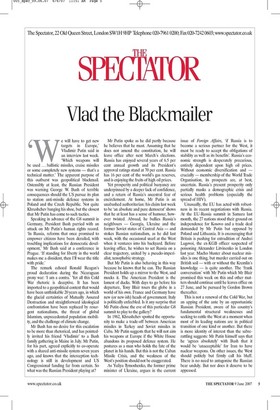Vlad the Blackmailer
W e will have to get new targets in Europe,' Vladimir in said in an interview last week.
Which weapons will be used ... ballistic missiles, cruise missiles or some completely new systems — that's a technical matter.' The apparent purpose of this outburst was geopolitical blackmail. Ostensibly at least, the Russian President was warning George W Bush of terrible consequences should the US pursue its plan to station anti-missile defence systems in Poland and the Czech Republic. Not quite Khrushchev banging his shoe, but the closest that Mr Putin has come to such tactics.
Speaking in advance of the G8 summit in Germany, President Bush parried with an attack on Mr Putin's human rights record. 'In Russia, reforms that once promised to empower citizens have been derailed, with troubling implications for democratic development,' Mr Bush said at a conference in Prague. 'If standing for liberty in the world makes me a dissident, then I'll wear the title with pride.'
The remark echoed Ronald Reagan's proud declaration during the Nicaraguan proxy war: 'I am a contra.' Yet all this Cold War rhetoric is deceptive. It has been imported to a geopolitical context that would have been unthinkable 20 years ago, in which the glacial certainties of Mutually Assured Destruction and straightforward ideological confrontation have been replaced by resurgent nationalisms, the threat of global Islamism, unprecedented population mobility, and the challenge of climate change.
Mr Bush has no desire for this escalation to be more than rhetorical, and has pointedly invited his friend 'Vladimir' to a Bush family gathering in Maine in July. Mr Putin, for his part, agreed explicitly to co-operate with a shared anti-missile system seven years ago, and knows that the interception technology is still in development and US Congressional funding far from certain. So what was the Russian President playing at?
Mr Putin spoke as he did partly because he believes that he must. Assuming that he does not amend the constitution, he will leave office after next March's elections. Russia has enjoyed several years of 6.5 per cent annual growth and its President's approval ratings stand at 70 per cent. Russia has 16 per cent of the world's gas reserves, and is enjoying the fruits of high oil prices.
Yet prosperity and political buoyancy are underpinned by a deeper lack of confidence, and a return of Russia's ancestral fear of encirclement. At home, Mr Putin is an unabashed authoritarian: his claim last week to be 'an absolute and pure democrat' shows that he at least has a sense of humour, however twisted. Abroad, he bullies Russia's neighbours — Georgia, Ukraine and the former Soviet states of Central Asia — and stokes Russian nationalism, as he did last week, with the occasional snarl at the West when it ventures into his backyard. Before leaving office, he wishes to set Russia on a clear trajectory, united by a pseudo-imperialist, xenophobic strategy.
But Mr Putin is also behaving in this way because he knows that he can. The Russian President holds up a mirror to the West, and mocks it. The American President is the lamest of ducks. With days to go before his departure, Tony Blair tours the globe in a world of his own. France and Germany have new (or new-ish) heads of government. Italy is politically enfeebled. Is it any surprise that Mr Putin chose the eve of this particular G8 summit to play to the gallery?
In 1962, Khrushchev spotted the opportunity to make a trade-off between American missiles in Turkey and Soviet missiles in Cuba. Mr Putin suggests that he will not aim his weapons at Europe if the White House abandons its proposed defence system. He postures as a man who holds the fate of the planet in his hands. But this is not the Cuban Missile Crisis, and the weakness of the West's position should not be exaggerated.
As Yuliya Tymoshenko, the former prime minister of Ukraine, argues in the current issue of Foreign Affairs, 'if Russia is to become a serious partner for the West, it must be ready to accept the obligations of stability as well as its benefits'. Russia's economic strength is desperately precarious, entirely dependent upon high oil prices. Without economic diversification and — crucially — membership of the World Trade Organisation, its prospects are, at best, uncertain. Russia's present prosperity only partially masks a demographic crisis and serious health problems (especially the spread of HIV).
Unusually, the EU has acted with robustness in its recent negotiations with Russia. At the EU-Russia summit in Samara last month, the 27 nations stood their ground on independence for Kosovo and a trade deal demanded by Mr Putin but opposed by Poland and Lithuania. It is encouraging that Britain is pushing for extradition of Andrei Lugovoi, the ex-KGB officer suspected of poisoning Alexander Litvinenko in London last year. Macho bluster about nuclear missiles is one thing, but murder carried out on British soil — with or without the Kremlin's knowledge — is quite another. The `frank conversation' with Mr Putin which Mr Blair promised this week on this and other matters should continue until he leaves office on 27 June, and be pursued by Gordon Brown thereafter.
This is not a renewal of the Cold War, but an upping of the ante by an opportunistic Russian President, aware of his country's fundamental structural weaknesses and seeking to rattle the West at a moment when most of its leading nations are in political transition of one kind or another. But there is more identity of interest than the sabrerattling suggests: Mr Putin himself says that he 'agrees absolutely' with Bush that it would be 'unacceptable' for Iran to have nuclear weapons. On other issues, the West should politely but firmly call his bluff. There is no need to antagonise the Russian bear unduly. But nor does it deserve to be appeased.




























































 Previous page
Previous page